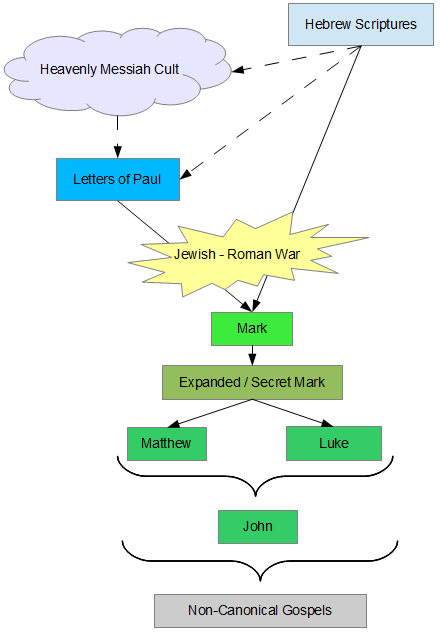How a Fictional Jesus Gave Rise to Christianity - By R.G. Price - 11/23/2014
- Having written several pieces on the historicity of Jesus (Jesus Myth - The Case Against Historical Christ, Jesus Myth Part II - Follow-up, Commentary, and Expansion, The Gospel of Mark as Reaction and Allegory), I think it is of critical importance to not simply cast doubt on the historical existence of Jesus, but to actually put forward plausible explanations for the development of early Christian writings and how the widespread belief in a real life Jesus was established. This piece builds on the evidence laid out in my prior writings and ties everything together into a cohesive explanation for the origins of belief in a human Jesus and the development of early Christian history.
I want to make something very clear: Not only do I think that "Jesus never existed", I think it's very possible, given the evidence, to build a solid case which proves "beyond a reasonable doubt" that Jesus did not exist. The primary pieces of evidence in my case against the existence of Jesus are in fact the Gospels themselves.
After having studied this subject for years, I have moved away from the term "myth" to describe the origins of "Jesus", and now view the origins of belief in a real human Jesus to be a product of misunderstood fiction. I call this the Fictional Jesus Theory. What I will do first is provide a basic overview of how I think the belief in a real Jesus and the rise of Christianity occurred, then lay out the evidence supporting my Fictional Jesus Theory.
- •Overview
•Apocalyptic Origins of Christian Theology
•Creation of the Markan Narrative
•Development of the Other Gospels
•The Author of Mark had Read the Letters of Paul
•"Q" or a Lost Version of Mark?
•Non-canonical Gospels
•Summary of the Gospel Analysis
•The Reception and Impact of the Gospels
•All Knowledge of Jesus Came from the Gospels
•Confusion of the Early Christian Scholars
•The New Pantheon of Christian Heroes
•Summary and Conclusion

Concluding paragraph ...
The interpretation of the Gospels by the original church fathers was simply a misunderstanding. It was, quite arguably, the single biggest and most important literary misunderstanding in the history of the world. It's a misunderstanding that completely changed the course of history and reshaped Western Civilization. Recognizing and understanding the literary allusions in the Gospel of Mark, however, leaves little doubt that the story was originally written as fiction and that its protagonist, Jesus, was a fictional character, who never actually existed. - •Overview